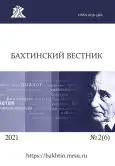Vol 3, No 2 (2021)
- Year: 2021
- Published: 24.10.2024
- Articles: 10
- URL: https://bakhtiniada.ru/2658-5480/issue/view/17021
Full Issue
Theoretical research
Features of cultural meanings in the works of M.M. Bakhtin
Abstract
The article examines the problem of cultural meaning in the works of M.M. Bakhtin in comparison with the ideas of Russian and European thinkers: L. Wittgenstein, G. Frege, G.G. Shpet and others. The author emphasizes the uniqueness of Bakhtin’s view of the concept of “meaning”.
 4-11
4-11


The educational regime of the Bakhtinian dialogue
Abstract
Many dialogue-oriented educationalists are attracted to the Bakhtinian dialogue. In this theoretical essay, I have abstracted five major features of the Bakhtinian dialogue and consider what kind of educational regime emerges from these features. In conclusion, I problematize the notion of Bakhtinian dialogue and its regime for education.
 12-23
12-23


Shaking the habitual: A synthesis between Bakhtinian dialogism and Shklovsky’s defamiliarisation through relational aesthetics
Abstract
This essay constitutes an attempt to synthesise Russian literary theorist Viktor Shklovsky’s definition of art as proposed in "Art as Technique'' and Russian philosopher Mikhail Bakhtin’s concept of dialogicity. It will incorporate themes from French art critic Nicolas Bourriaud’s book Relational Aesthetics, which heavily rely on the relations between viewer and art. Central to this attempt is Shklovsky’s concept of defamiliarisation – a roughening of the perception. Taken together with Bakhtin’s ideas on multivoicedness, and Bourriaud’s inter-subjective aestheticism, defamiliarisation can be seen as a powerful tool through which to establish a dialogue between subject and object—a dialogue that engenders, authors, and creates art. Shklovsky also states that the object is not important for art to happen. This view, when taken to its logical extreme, contends that everything and anything can be art, which many critics consider to be a damaging notion. Detractors of this perspective will often gripe about how art becomes meaningless with such assumptions, and that this leads to a nihilistic interpretation of—not just art—but of the grander project of life, but this paper rejects this fearful attitude and instead strives to surpass petty existentialism for a more constructive mindset. This stance already reeks of a postmodern interpretation of art and therefore, as David Shepherd has said, runs the risk that any Bakhtinian interpretation does. Namely, that of "seeming to rehearse the tired gesture by which the Soviet theorist is burdened with the credit for having [...] always already anticipated and surpassed the most significant theoretical trends of recent decades'' [Shepherd, 1989, p. 91]. However, the crux of this synthesis lies precisely in the interplay between the three perspectives; it is neither Bakhtin, nor Shklovsky, nor Bourriaud who has the singular concept which leads to a more positivistic infusion to add to this meaning-denying philosophical stance. Instead, the radical implications contained within all three authors’ works come together in dialogue, and only then are able to form a more constructive aesthetics of art and artfulness.
 24-29
24-29


Books by aestheticians A.I. Burov and Yu.B. Borev in M.M. Bakhtin’s personal library
Abstract
The personal library of M.M. Bakhtin makes it possible to form a more complete picture not only of his scientific and artistic interests, of him as a reader, but also of the personalities and fates of the authors, whose books are in his library (with their inscriptions and/or Bakhtin’s proprietary inscriptions). The thinker’s library is a practical proof that “... in a great time, nothing never loses its meaning”. In particular, the Bakhtin’s library opens up new perspectives in the study of the scientific heritage of A.I. Burov and Yu.B. Borev, whose works are discussed in this article.
 30-38
30-38


From archives
M.M. Bakhtin’s lectures on the history of foreign literature recorded by M.A. Beban. Part 6. Publication, introductory article and notes by I.V. Klyueva
Abstract
The paper presents a fragment of M.M. Bakhtin’s lectures as he read at the Mordovia State Pedagogical Institute (now N.P. Ogarev Mordovia State University) in the second semester of the academic year 1936/37. It was recorded by M.A. Beban – a Moksha-Mordovian writer, one of the founders of the professional Mordovian literature, that days – a student of the Faculty of Literature. The fragment includes the consideration of the theme «The history of French Renaissance literature».
 39-54
39-54


Materials for the Bakhtin Encyclopaedia
 55-56
55-56


 57-59
57-59


 60-62
60-62


 63-67
63-67


Reviews, scientific chronicles
Mikhail Bakhtin: Author and Hero of an autobiography A review of: Аванесов С.С., Смирнов С.А., Спешилова Е.И. Человек у зеркала: антропология автобиографии. СПб.: Алетейя, 2021. 638 с.
 68-69
68-69











